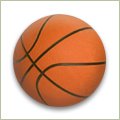
There's not much that can keep Dwayne Wade from playing basketball.
He's got a reputation for getting knocked down and getting back up each time.
Last Winter, though, he got hit by something worse than a bruised quad - the Flu.
And that wasn't the first time a virus infection took its toll on D-Wade. He suffered a similar fate back in 2006.
Since Flash is smart enought to wear pads under his uniform to reduce his risk of injury, I hope that he's also smart enough to get a flu shot at the start of each season.
So what about you?
Do you take steps to reduce your risk of catching a cold or flu during basketball season?
Here's a good article from 2006 written by Dr Tom Brickner , a team physician here at UNC.
Read it.
Think about it.
Then talk to your local doctor about getting a flu shot.
Don't like shots? You might be able to use an inhaled flu vaccine.
Again, talk with your doctor about the pros and cons of it before you decide.
And don't forget to wash your hands.
Often.











